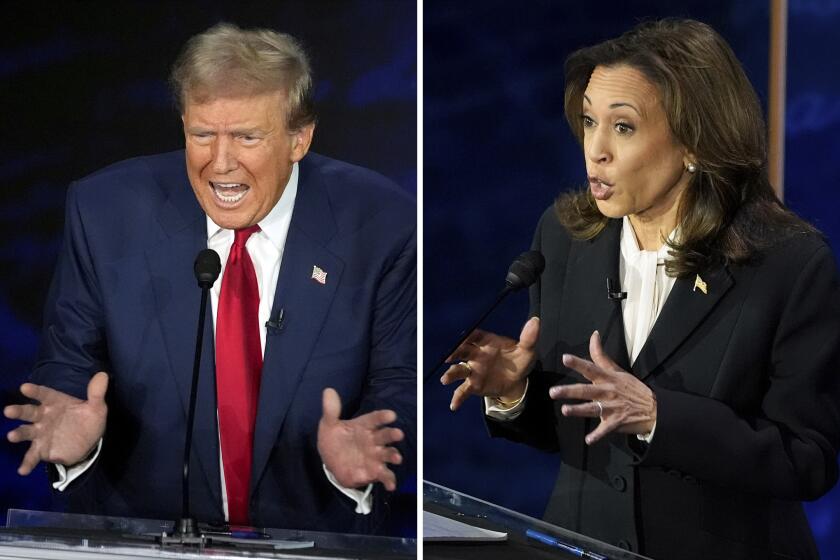Democrats Rebuffed on Case Files
The Bush administration Friday issued a blanket rejection of Democratic requests for further documents connected to Supreme Court nominee John G. Roberts Jr., arguing it was “simply contrary to the public interest” to release the material.
The letter from the Justice Department came in response to several Democratic requests, including one earlier Friday, seeking access to 16 case files from Roberts’ service as deputy solicitor general in the administration of President George H.W. Bush.
Democrats said they were seeking a “targeted” release of 16 of more than 300 cases Roberts worked on during his service in the senior Bush’s administration, where he was a high-ranking political appointee and chief deputy to then-Solicitor General Kenneth W. Starr.
Sen. Patrick J. Leahy of Vermont, the ranking Democrat on the Judiciary Committee, criticized what he termed “the decision to keep these documents under wraps.”
He argued that it was important for the committee to have access to some of Roberts’ work in the solicitor general’s office because “this was the highest-ranking job” he held in any administration.
The White House has refused to release any documents from that period, arguing that the work of the solicitor general’s office is confidential and should stay that way. It reiterated that position Friday.
“These internal discussions among lawyers have always been considered privileged, covered by both the deliberative process privilege and the attorney-client privilege,” Assistant Atty. Gen. William Moschella wrote in a letter to Leahy. “For the solicitor general’s office to perform its public service effectively, the internal deliberations of the office must remain confidential.”
Another Democrat on the Judiciary Committee, Sen. Charles E. Schumer of New York, said the refusal would raise the stakes for the hearings the panel would conduct in September on the nomination of Roberts, now a judge on the U.S. Court of Appeals for the District of Columbia Circuit.
“It will make our job of learning Judge Roberts’ judicial philosophy and legal reasoning so much the harder and puts a special onus on fair and thorough hearings where Judge Roberts answers questions fully and unambiguously,” Schumer said in a statement.
The dispute over the documents signaled that the fight over Roberts’ nomination was heating up and that the hearings on him could prove contentious. At least one liberal group that opposes Roberts, NARAL Pro-Choice America, plans to begin running television ads against his confirmation next week.
Although many Senate Democrats consider him more politically conservative than they would like, Roberts appears headed for confirmation. A number of moderate Democratic senators have said they consider Roberts qualified to serve on the nation’s highest court. And without their support, their party can’t mount a filibuster, the only move that could block his confirmation.
Sen. Edward M. Kennedy (D-Mass.), another Judiciary Committee member, expressed optimism that the administration might yet respond to the Democrats’ request.
“This is clearly the opening salvo in what will be a long negotiation,” Kennedy said. “The fact that the letter is from a third-level official in the Justice Department gives me some hope that the attorney general is reserving his options.”
The Justice Department disclosed Friday that it had provided the Judiciary Committee with a listing of all the cases in which Roberts was the supervising deputy while in the solicitor general’s office, and a list of cases where Roberts was the “decision maker” when Starr was unavailable.
Shortly after Bush announced Roberts’ nomination last month, the White House delivered to the Judiciary Committee several thousand pages of documents relating to Roberts’ work in the Reagan administration.
Roberts served as a special assistant to Atty. Gen. William French Smith in 1981 and 1982 and later worked as a lawyer in the White House counsel’s office under Reagan.
The Judiciary Committee had not asked for the Reagan-era documents.
“With fanfare and photo ops, the administration has delivered documents that we have not asked for, which provide less insight into Judge Roberts’s views and were already available to the Senate,” Leahy said in a statement.
“But they will not provide the records that are the most meaningful as the Senate prepares to make this important decision on behalf of the American people.”
In the provided documents, Democrats said Roberts appeared to show some hostility to civil rights and other individual protections.
In an apparent effort to soften that impression, the White House released two documents to the Judiciary Committee on Friday in which Roberts counseled the Reagan administration not to support two conservative causes. The documents were first released to the Washington Post on Thursday.
In one, Roberts argued that Reagan should not voice support for antiabortion activists convicted of violence against abortion clinics.
“No matter how lofty or sincerely held the goal, those who resort to violence to achieve it are criminals,” Roberts wrote.
In the second document, Roberts counseled the president not to voice support for a proposed Kentucky resolution that would have required each school in the state to hang a plaque reading “In God We Trust.”
Roberts said the draft resolution raised concerns about the separation of church and state.
Times staff writer Richard B. Schmitt contributed to this report.
More to Read
Get the L.A. Times Politics newsletter
Deeply reported insights into legislation, politics and policy from Sacramento, Washington and beyond. In your inbox three times per week.
You may occasionally receive promotional content from the Los Angeles Times.










